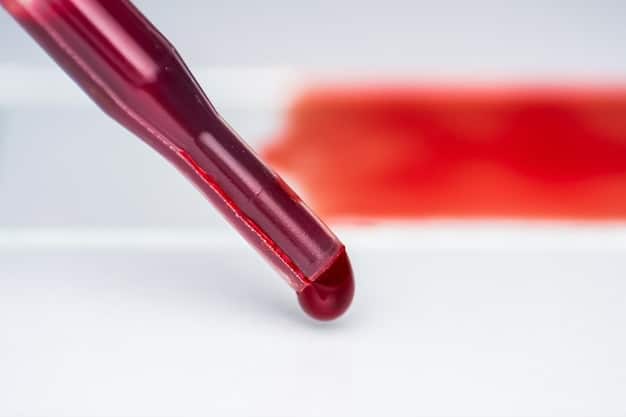Lower Cholesterol Quickly: 6-Week Diet & Exercise Plan

Lower Your Cholesterol by 10% in 6 Weeks: A Diet and Exercise Plan That Works involves adopting a heart-healthy diet rich in fiber, fruits, vegetables, and lean proteins, combined with regular physical activity and stress management techniques to improve cholesterol levels naturally.
High cholesterol can be a silent threat, increasing your risk of heart disease and stroke. But what if you could significantly lower your cholesterol by 10% in 6 weeks: A diet and exercise plan that works is within your reach? This comprehensive guide provides a step-by-step approach to naturally improving your cholesterol levels, empowering you to take control of your health and well-being.
Understand Your Cholesterol Levels
Before embarking on a cholesterol-lowering journey, it’s crucial to understand what cholesterol is and what your current levels are. This knowledge serves as the foundation for making informed decisions about your diet and exercise plan.
What is Cholesterol?
Cholesterol is a waxy, fat-like substance found in all cells of the body. Your body needs cholesterol to make hormones, vitamin D, and substances that help you digest foods. However, having too much cholesterol in your blood can lead to plaque buildup in your arteries, increasing your risk of heart disease.
Types of Cholesterol
- LDL (Low-Density Lipoprotein): Often referred to as “bad” cholesterol, high levels of LDL cholesterol can lead to plaque buildup in the arteries.
- HDL (High-Density Lipoprotein): Known as “good” cholesterol, HDL helps remove LDL cholesterol from the arteries.
- Triglycerides: Another type of fat in the blood, high levels of triglycerides can also increase the risk of heart disease.

Understanding your cholesterol levels is the first step in managing your heart health. Consult with your doctor to get a comprehensive lipid panel and discuss your results.
Craft a Heart-Healthy Diet
Diet plays a pivotal role in managing cholesterol levels. By making conscious food choices, you can significantly impact your LDL cholesterol and improve your overall heart health. Focus on incorporating foods that are known to lower cholesterol and limiting those that contribute to its increase.
Prioritize soluble fiber, healthy fats, and plant-based protein sources to maximize the cholesterol-lowering benefits of your diet.
Foods to Embrace
- Oatmeal: Rich in soluble fiber, oatmeal helps reduce the absorption of cholesterol into your bloodstream.
- Nuts: Almonds, walnuts, and other nuts are packed with healthy fats and fiber, contributing to lower LDL cholesterol.
- Fatty Fish: Salmon, tuna, and mackerel are rich in omega-3 fatty acids, which can help lower triglycerides and improve HDL cholesterol.
Adopting a heart-healthy diet is a powerful step towards lowering your cholesterol and improving your overall well-being. Experiment with different recipes and find healthy food choices that you enjoy.
Get Moving: Exercise for Cholesterol Control
Regular physical activity is a cornerstone of a healthy lifestyle and plays a crucial role in managing cholesterol levels. Exercise not only helps lower LDL cholesterol but also boosts HDL cholesterol, offering a dual benefit for heart health.
Aim for a combination of aerobic exercise and strength training to maximize the positive impact on your cholesterol levels.

Recommended Exercises
- Brisk Walking: A simple yet effective exercise that can be easily incorporated into your daily routine.
- Cycling: A great way to get your heart rate up and improve your cardiovascular health.
- Swimming: A low-impact exercise that is gentle on your joints.
Regular exercise is an investment in your heart health. Find activities that you enjoy and make them a consistent part of your lifestyle.
Stress Management Techniques
Stress can negatively impact your cholesterol levels and overall heart health. Chronic stress can lead to unhealthy behaviors, such as overeating and physical inactivity, which can further exacerbate cholesterol issues. Incorporating stress management techniques into your daily routine is essential for maintaining healthy cholesterol levels and promoting overall well-being.
Effective Techniques
Relaxation techniques, such as deep breathing and meditation, can help reduce stress hormones and improve overall cardiovascular health.
Mindfulness involves focusing on the present moment without judgment, helping to reduce anxiety and promote emotional well-being.
Engaging in hobbies and activities you enjoy can provide a healthy outlet for stress and improve your overall mood.
Prioritizing stress management is an essential component of a holistic approach to lowering cholesterol and improving your overall quality of life.
Track Your Progress and Stay Motivated
Monitoring your progress is crucial for staying motivated and ensuring that your diet and exercise plan is effectively lowering your cholesterol. Keeping track of your food intake, exercise routine, and cholesterol levels can provide valuable insights and help you adjust your approach as needed.
Regularly tracking your progress serves as a powerful motivator and helps you stay committed to your cholesterol-lowering goals.
Methods for Tracking
Keep a food diary to record your daily meals and snacks, paying attention to portion sizes and nutritional content. This can help you identify areas where you can make healthier choices.
Use a fitness tracker or app to monitor your daily steps, exercise duration, and intensity. This can help you stay accountable and motivated to reach your fitness goals.
Schedule regular cholesterol tests with your doctor to monitor your progress and assess the effectiveness of your lifestyle changes.
Tracking your progress and celebrating your achievements can help you stay motivated and committed to maintaining healthy cholesterol levels.
Consult with Healthcare Professionals
While diet and exercise are powerful tools for lowering cholesterol, it’s essential to consult with healthcare professionals for personalized guidance and monitoring. A doctor or registered dietitian can assess your individual needs, provide tailored recommendations, and help you navigate any challenges you may encounter.
Professional guidance ensures that your cholesterol-lowering plan is safe, effective, and aligned with your specific health needs.
Benefits of Professional Consultation
A healthcare professional can conduct a comprehensive assessment of your health history, lifestyle, and cholesterol levels to develop a personalized plan.
They can provide expert guidance on dietary modifications, exercise regimens, and stress management techniques.
Healthcare professionals can monitor your progress, adjust your plan as needed, and address any concerns or challenges you may face.
Partnering with healthcare professionals ensures that you receive the best possible care and achieve optimal results in your cholesterol-lowering journey.
| Key Point | Brief Description |
|---|---|
| 🍎 Diet | Focus on fiber, healthy fats, and plant-based protein. |
| 💪 Exercise | Aim for a mix of aerobic and strength training activities. |
| 🧘 Stress Management | Incorporate techniques like meditation and hobbies. |
| 📈 Tracking | Monitor food intake, exercise, and cholesterol levels regularly. |
Frequently Asked Questions
▼
Yes, a heart-healthy diet can significantly lower cholesterol. Focus on fiber-rich foods, healthy fats, and lean proteins, while limiting saturated and trans fats. Consistency is key for noticeable improvements.
▼
Aim for at least 30 minutes of moderate-intensity exercise most days of the week. Activities like brisk walking, cycling, or swimming can help lower LDL and raise HDL cholesterol.
▼
Foods like oatmeal, nuts, fatty fish, olive oil, and plant sterols are effective for lowering LDL cholesterol. Incorporate these regularly into your diet for optimal results.
▼
Some people see improvements in cholesterol levels within a few weeks of adopting a heart-healthy diet and exercise plan. Consistency and commitment are crucial for achieving and maintaining long-term results.
▼
Some supplements, like omega-3 fatty acids and plant sterols, may help lower cholesterol. However, it’s important to consult with your doctor before taking any supplements, as they can interact with medications.
Conclusion
Lower Your Cholesterol by 10% in 6 Weeks: A Diet and Exercise Plan That Works is a achievable goal through a combination of dietary changes, regular physical activity, and stress management. By adopting a heart-healthy lifestyle and seeking guidance from healthcare professionals, you can significantly improve your cholesterol levels, reduce your risk of heart disease, and enhance your overall well-being.





